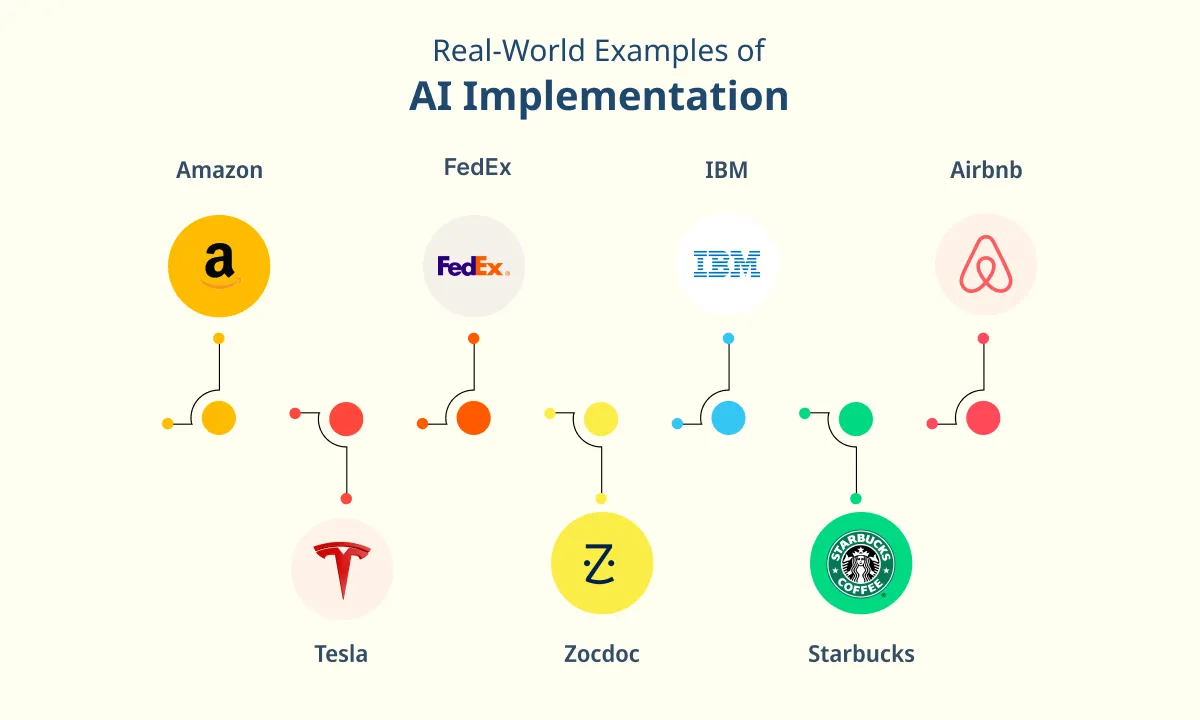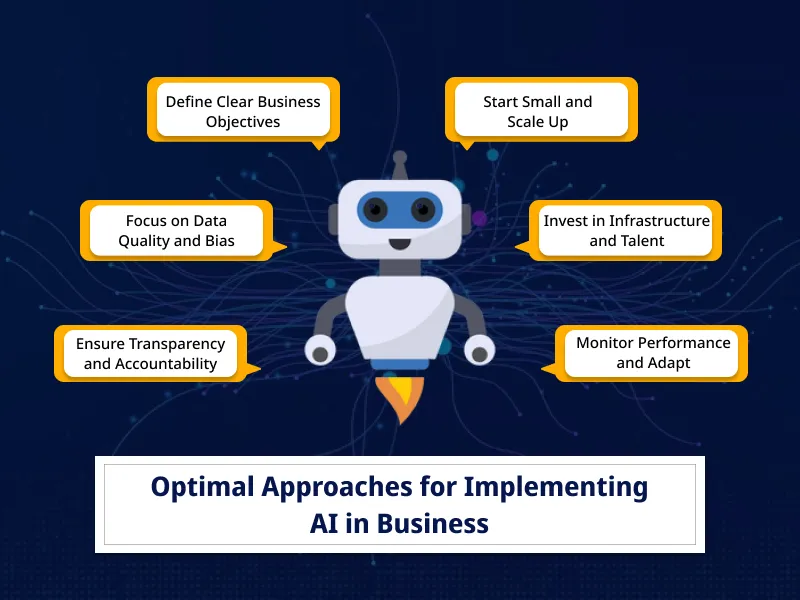Artificial Intelligence (AI) has become integral to modern-day business operations. According to a report by McKinsey, adopting AI could contribute up to $13 trillion to the global economy by 2030.
AI has been a buzzword for quite some time now, and it’s no secret that businesses are looking to leverage its power to drive success. However, the question remains – how exactly can AI be used in practical business scenarios?
In this blog post, we’ll explore real-world examples of how companies have unlocked the potential of AI to take their operations to new heights. From predictive analytics to chatbots and beyond, get ready to discover how AI can transform your business!
Why Artificial Intelligence is Key to Success?
The power of AI can transform the way businesses function. Here are some of the most significant benefits of AI in business:
- Cost Reduction: Artificial Intelligence helps businesses reduce costs by automating repetitive tasks requiring manual efforts. This can free up resources for more critical business operations.
- Increased efficiency & Productivity: Artificial Intelligence in business can improve efficiency & productivity by automating tasks, optimizing workflows, and improving decision-making.
- Improved Customer Experience: If you want to improve your customer experience, AI-powered chatbots & voice assistants can provide 24/7 customer support, reducing wait times and improving overall customer satisfaction.
- Better Decision-making: AI can provide businesses with real-time insights and predictive analytics, allowing for more informed and accurate decision-making. You can hire machine learning experts to leverage this technology at its best.
Its Time to Optimize Your Business Operations!
Real-World Examples of AI in Business Success
To help you understand the significance of AI, let’s look at some real-world examples of AI in various industries.
Healthcare
AI has given the healthcare sector an all-new approach to dealing with various issues that require manual efforts. The power of AI can be seen in various departments of healthcare, such as:
- Diagnosis & treatment: AI-powered diagnosis tools can help doctors and medical professionals accurately diagnose illnesses and provide personalized treatment plans. This saves time and enables doctors to allocate their time to needy patients.
- Drug discovery: AI can help pharmaceutical companies accelerate drug discovery and development by analyzing massive data and identifying potential drug candidates.
- Medical image analysis: AI is advanced enough to analyze medical images, like X-rays and MRIs, to help doctors and radiologists detect and diagnose medical conditions more accurately, reducing the need to occupy medical staff with mundane and repetitive tasks.
Finance
AI supports financial institutions to improve efficiency, reduce costs, and enhance customer experience. Businesses often hire dedicated software development teams to ensure the best AI development strategies are implemented.
Here are some commonly used cases of AI in the finance industry:
- Risk management: AI can help financial institutions identify and manage risks more effectively by analyzing data and providing real-time insights. You can hire IoT developers to connect the risk management apps with the wearables.
- Fraud detection: AI-powered fraud detection systems can help financial institutions identify fraudulent transactions and prevent economic losses.
- Trading: AI can help traders analyze market data and make more informed investment decisions, improving investment outcomes.
- Customer Services: AI-powered chatbots can provide quick & accurate responses to customer queries, reducing the need for human intervention.
- Chatbots: AI-powered chatbots can provide 24/7 customer support, reducing wait times and improving overall customer satisfaction.
- Voice assistants: AI-powered voice assistants can help customers with simple tasks like checking account balances and making transactions.
- Personalized support: AI can provide personalized support to customers by analyzing their behavior and preferences, improving the overall customer experience.
Retail
The scope of AI in the retail businesses is vast as the revolutionary technology offers multifaceted benefits to the industry; here are some of the use cases:
- Inventory management: AI can help retailers optimize inventory levels by predicting demand, reducing waste, and avoiding stockouts.
- Personalized recommendations: AI can provide personalized product recommendations to customers based on their preferences and behavior, improving the shopping experience.
- Fraud detection: AI-powered fraud detection systems can help retailers identify fraudulent transactions and reduce losses due to fraud.
Also Read: .NET vs. PHP vs. Java vs. Python – Which Language is Better for Web Development?
Manufacturing
The advent of Artificial Intelligence has left no industry untouched, and manufacturing is one of them. Here are some of the commonly used cases in the manufacturing industry:
- Predictive maintenance: AI-powered predictive maintenance systems can support manufacturers in identifying equipment failure before it happens, reducing downtime, and improving productivity.
- Supply chain optimization: AI can optimize the supply chain by predicting demand, reducing lead times, and optimizing inventory levels.
- Quality control: With the power of AI, manufacturers can improve quality control by identifying product defects and anomalies during manufacturing.
Also Read: Top 21 Machine Learning Development Companies Supporting SME & Enterprises ML Adoption
Challenges & Risks of AI Implementation For Businesses
While the benefits of AI in business are undeniable, some challenges & risks arise while implementing this futuristic technology. Here are some of the most significant challenges and risks of AI implementation that businesses should consider:
1. Data Quality & Bias
One of the main challenges of implementing AI is ensuring data quality and mitigating bias. AI algorithms are only as good as the data they are trained on, and if the data is biased or of poor quality, the resulting AI system may also be biased or inaccurate. This can lead to unintended consequences and undermine the benefits of AI.
2. Cybersecurity and Privacy
AI systems may be vulnerable to cyber attacks, and businesses must ensure that their AI systems are secure and do not compromise sensitive data or violate privacy regulations. These systems may also raise ethical concerns about privacy & data and require software development companies’ expertise to tackle them.
3. Integration with Existing Systems
Integrating AI systems with existing business systems and processes can be challenging. Businesses must ensure that AI systems communicate effectively with other systems and that the integration process does not disrupt existing operations.
4. Cost & ROI
Implementing AI systems can be costly, and businesses must carefully evaluate the potential return on investment (ROI) before investing in it. In some cases, the benefits of AI may not outweigh the costs, or the ROI may take longer to realize than expected. So they need a careful assessment before hiring IoT development company.
5. Skills Gap
Implementing AI systems requires specialized skills, and there is a need for more professionals with expertise in AI. Businesses may struggle to hire machine learning experts qualified to implement and manage AI systems.
6. Regulation & Legal Compliance
To fully leverage the power of AI, businesses must ensure that their AI systems comply with relevant regulations and are transparent and accountable. Depending on the industry and use case, AI systems may be subject to regulation and legal compliance requirements.
Drive Real Time Business Success
Best Practices For AI Implementation in Business
AI can potentially transform businesses, but successful implementation requires careful planning & execution. Our team helped one of our Kuwait-based clients implement a TAMS to handle medical emergencies. Over 50% of hospitals adopted TAMS to improve their services.
Let’s have some of the best practices for AI implementation in business.
1. Define Clear Business Objectives
Before implementing AI, businesses need to define clear objectives and identify areas where AI can deliver the most value. This may involve conducting a thorough analysis of business processes and identifying pain points and areas for improvement.
2. Start Small and Scale Up
AI implementation can be complex, and it is often best to start with a small pilot project before scaling up. This approach allows businesses to test and refine their AI systems and ensure they deliver the intended results.
3. Focus on Data Quality and Bias
AI algorithms are only as good as the data they are trained on, so businesses must ensure their data is high quality and free from bias. This may involve cleaning and normalizing data and using techniques such as data augmentation to improve the data quality.
4. Invest in Infrastructure and Talent
AI implementation requires specialized infrastructure and personnel, and businesses must ensure they have the necessary resources. This may involve investing in high-performance computing infrastructure and hiring personnel with AI and machine learning expertise.
5. Ensure Transparency and Accountability
AI systems can be complex and opaque, and businesses must ensure that their AI systems are transparent and accountable. This may involve using techniques such as explainable AI to help users understand how AI systems make decisions.
6. Monitor Performance and Adapt
AI systems are not static, and their performance can degrade over time. Businesses need to monitor the performance of their AI systems and adapt them as necessary. This may involve retraining AI models, refining business processes, or implementing new algorithms.
Also Read – What is Deepfake AI and Its Potential
Final Words
AI has proven to be a powerful tool for businesses in various industries. From improving customer experience to streamlining internal processes and reducing costs, the benefits of AI are undeniable. Real-world examples of successful AI implementation show that businesses that embrace this technology will likely gain a competitive advantage in the market.
With careful planning and execution, businesses can unlock the full potential of AI and drive growth and success. However, it’s essential to consider the challenges and risks of AI implementation and follow the best AI development strategies to ensure a successful deployment. To avoid challenges, you can hire machine learning experts to implement AI in your business.







